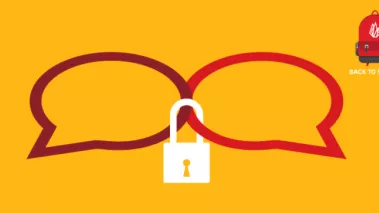Table of Contents
When to pull the FIRE Alarm: Common types of censorship on campus

Yesterday, my colleague Marieke recounted some of the recent threats to freedom of speech on college campuses and warned that this coming year will be little different: “[S]ome college administrators will be determined to suppress controversy by suppressing controversial speech, or by curtailing when and where speech can take place.”
But what will those threats look like? Censorship does not always take the form of a villainous administrator seizing copies of a critical student newspaper and escaping in a black helicopter. Threats to free speech may not always be immediately apparent unless you know what to look out for. When should you ask for FIRE’s help?
Here are some common examples of censorship on campus for student organizers — and those who help student organizers — to watch out for. If you see any of these red flags, get in touch with us:
- Refusal of recognition: Administrators or student governments may try to deny official recognition to a student organization because of its message or beliefs, or because chapters at other schools have engaged in civil disobedience. Sometimes recognition is refused when the school believes a group is too similar in its beliefs to another organization.
- Refusal of funding: Student governments may try to deny funds for an organization, event, or speaker because of the message.
- Requiring permits, permission, or quarantining speech to “free speech zones”: Administrators might demand advance approval to hold a protest, post flyers, or distribute literature on campus, or limit advocacy to a small or out-of-the-way area on campus.
- Security fees: A college might try to require student organizations to pay for the cost of security for an event because it might draw protesters or because the event’s message is controversial.
- Bans on campaigning: College officials might move to censor student political expression because of a misguided concern that student speech regarding an election or candidate could jeopardize the school’s non-profit status.
- Punishment for social media posts: College officials sometimes try to punish students for protected speech over social media, especially when the speech is controversial and goes viral.
At public colleges, these types of restrictions may violate the First Amendment. At private schools, they may violate the institution’s advertised or promised commitment to freedom of expression. Schools can’t promise free speech in brochures and policies and then refuse to deliver once the tuition check has cleared.
Here at FIRE, we work to protect freedom of expression and association for students and faculty across the political spectrum — including Democrats, Republicans, Libertarians, Democratic Socialists, those who support or loathe President Trump, and those affiliated with no party at all; Muslims, Jews, Christians, and atheists; environmental activists, animal rights activists, pro-choice activists, anti-rape activists, anti-war activists, and LGBT activists; free market advocates, pro-life activists, anti-immigration activists, and anti-affirmative action activists; student reporters, student government members, students who want to talk about their mental health or their school’s historical connection to lynchings, adjunct faculty, and tenured professors; and many, many more.
Since 1999, FIRE has fought campus censorship. We use letters, press releases, and other public advocacy to stand up for student rights when schools engage in censorship. In certain circumstances, FIRE may also coordinate or file litigation to vindicate student and faculty rights.
If you think we might be able to help defend your ability to speak, organize, and advocate, please don’t hesitate to get in touch.
Recent Articles
Get the latest free speech news and analysis from FIRE.

VICTORY: Court vindicates professor investigated for parodying university’s ‘land acknowledgment’ on syllabus

Can the government ban controversial public holiday displays?

DOJ plan to target ‘domestic terrorists’ risks chilling speech
